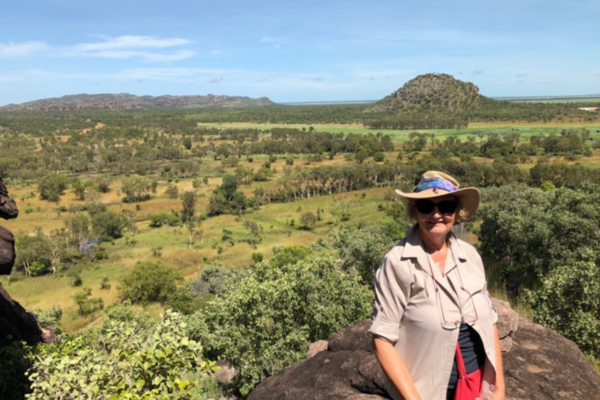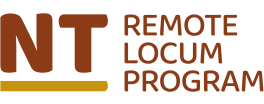
It’s a far cry from working night shifts at the neonatal intensive unit in the English city of Hull to life in a remote Northern Territory community.
Registered nurse Karen Wright says of working for RAHC, ‘I loved it from day one. I’m so grateful I gave it a go.’
Her story, she says, reads like a Mills and Boon romance. She met an Australian sheep shearer on a weekend break in the Yorkshire Dales. ‘He was in the caravan next door and I wrote a letter afterwards, addressed to ‘Shearer, Caravan Park’, inviting him for a coffee.
‘I knew as soon as I met Peter, I’d be living in Australia. And two years on, in 2004, I was.’
Perhaps the seed had been planted years earlier when a work colleague took a job with the RFDS in Australia. ‘On her return, she enthralled me with her stories as a midwife in Cairns. Whilst I thoroughly enjoyed my work in Hull, I felt I never did anything extraordinary, not like the scope and variety of what I deal with now.’
When first on-call for RAHC, Karen had to organise three people to be airlifted to hospital; one with severe chest pain, who ended up having a triple bypass, another for a broken arm and the third for a snake bite.
Working in primary healthcare, Karen diagnoses and treats medical conditions whilst managing chronic diseases, such as diabetes. ‘We work across the age span, from babies to the elderly. We do everything, from driving the ambulance to being on-call so as to provide a 24-hour service.’ She thrives on the challenge.
Soon after arriving in Australia, Karen and Peter bought a sheep farm close to Yass in New South Wales, and Karen found a full-time job in the neonatal unit at Canberra Hospital. ‘I was in a new relationship and a new country and wanted stability in my work, in a job I knew.’ After a few years, however, the seed planted about working remotely grew. ‘I sought information from Alice Springs and upgraded my skills for remote work. It was now or never.’
She first worked in Ntaria (Hermannsburg), 125 kilometres out of Alice Springs, in a long-term job. ‘I was there for two years. We got farm sitters and Peter came for the first year and worked in the store. Hermannsburg was such an accepting place and the nurses were friendly and helpful.’
Karen’s 23 years of experience as a neonatal nurse proved invaluable. ‘Babies can’t tell you what’s wrong. You have to look, listen, and feel. Some older Aboriginal people couldn’t speak English, so I had to use all of my senses to get information.’
Waiting and listening were equally vital. ‘Silence is a good thing. It gives people time to weigh up who we are and trust us. There are no quick consultations.
Someone may come in with a headache but it’s nothing to do with that. They may have a boil on their bottom but they won’t come out with that straightaway.’
Once trust is established, there are additional rewards.
‘I felt honoured to attend a ceremony, alongside other families, to celebrate the initiation of young men. We camped out on a sea of mattresses, shared kangaroo tail, danced and laughed for hours. It was an amazing experience to look up at the clear night sky and the stunning Milky Way.’
Since 2012, Karen has lost count of the RAHC placements she’s had in Central Australia and the Top End. She’s been to some communities several times and, due to the COVID-19 lockdowns, ended up staying six months rather than six weeks, in Gunbalanya – Oenpelli – in west Arnhem Land in 2020. ‘It was an incredibly beautiful community, with birds galore, from whistling kites to kingfishers, jacanas and jabiru. I love being out in nature.’
Karen has worked on Groote Eylandt and in two of the three Tiwi Island communities. ‘People fish and hunt, eating good, nutritious food such as magpie geese and their eggs, long-necked turtle and barramundi.’ Karen watched women wade into crocodile-infested billabongs to collect rough-skinned file snakes.
‘Sadly, there’s not so much hunting these days in Central Australia. There’s a little for kangaroo, bush turkey and goanna, but most of the food comes from the community store.’
A poor diet coupled with overcrowded living conditions – ‘no fridge, and up to 20 people in a house-sharing one shower’ – leads to many medical conditions, from skin sores and diabetes, heart and respiratory problems. ‘There’s a huge amount of Rheumatic Heart Disease, which doesn’t really exist anymore in the United Kingdom.’
Culture shock can occur in remote work. ‘We mostly come from privileged backgrounds with the luxuries we take for granted,’ says Karen. ‘So, it can be a shock initially to arrive in a remote community.’
Yet Karen experiences culture shock in reverse. It hits her when she returns south. ‘I miss the noise of the community, the smokey smells, and the openness of the children. They rush up to you, tell you their name and want to know who you are. There’s a kind of freedom in the communities that I find refreshing.
‘After working away, I found people back home moaned about trivial things. I realised how materialistic our culture is and how little people knew about Aboriginal people in the Northern Territory.’ Whilst the minimum is three weeks, Karen’s ideal placement is six to eight weeks. ‘Peter’s flexible, independent, and happy when I’m happy. So, I can stay longer and earn more than I would at the hospital.’
Karen has now come full circle and works as an educator for new RAHC staff. ‘It’s a way of giving back and knowing the next batch of nurses will be doing the right thing and learning the skills required to do a good job.’
She becomes emotional at the prospect of retirement. ‘It’s such a different way of nursing and of thinking compared to hospital work. All nursing should be holistic, you’re not just treating the illness. Aboriginal and Torres Strait Islander peoples heal spiritually and emotionally as well as physically.
‘And we don’t just treat people,’ she laughs, ‘we treat animals as well; budgies, horses, and I had a dog in the house one night having puppies.
‘My life has changed out of sight in so many ways. I’ve learnt skills I never thought possible, met wonderful people and learnt about their culture.
‘I’m so happy for my “now or never” moment.’
If you would like to share your RAHC story, please get in touch with your Regional Coordinator.
